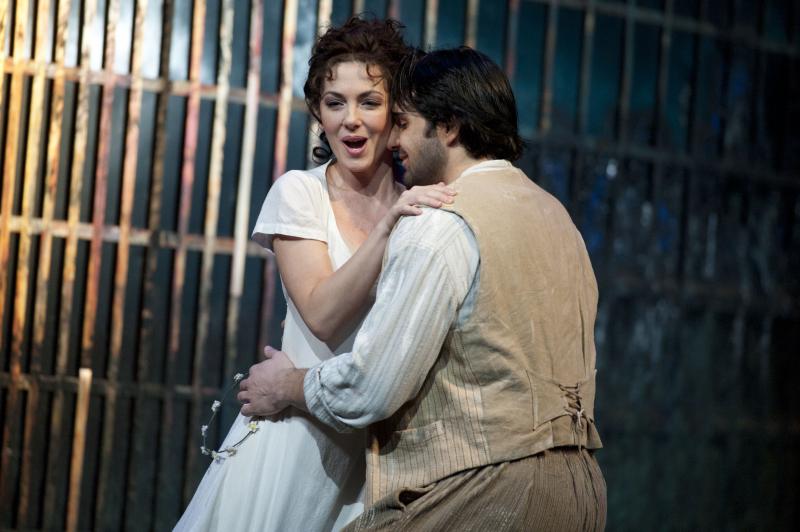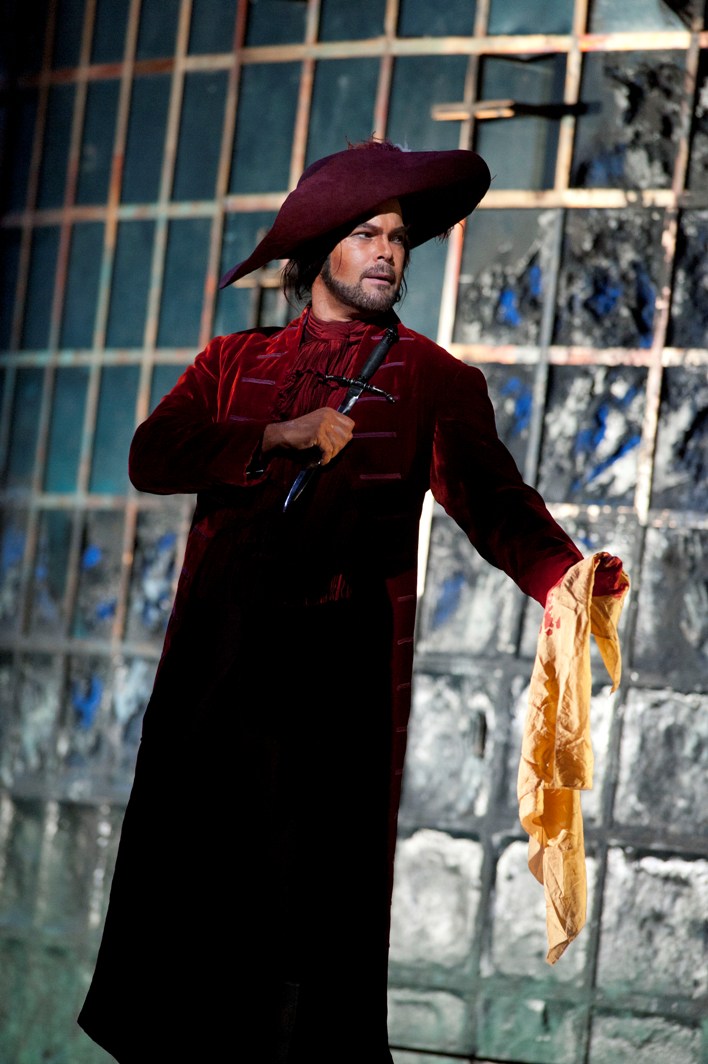Don Giovanni, Royal Opera | reviews, news & interviews
Don Giovanni, Royal Opera
Don Giovanni, Royal Opera
No amount of flames can generate heat in this lazy revival

Francesca Zambello’s production of Don Giovanni may only be 10 years old, but is already showing signs of decrepitude. Even back in its youth in 2002-3, this staging never had much of a spring in its step, but at least there were some fantastic casts to compensate.
Set outside what appears to be a particularly ugly municipal swimming pool c1990 – all glass panes and curving edges – Zambello’s tragedy plays out under the constant gaze of a Madonna. Perched precariously (and nonsensically) above the action, hands aloft in pity or helplessness, the statue is as ineffectual a moral framing device as the closing ensemble, though seemingly lacking any of Mozart’s irony. The Act I finale calls the revolve into play, flipping us from 1990s modernism into rather half-hearted 1790s decadence, and making brief sense of the quasi-authentic jewel coloured costumes. Visually it’s all functional enough, but really the best that can be said for the late Maria Bjørnson’s designs is that (with the exception of the suspended hand of doom that signals the Commendatore’s acquiescence – a bewildering piece of visual distraction) they don’t actively get in the way.
 There’s little specificity to the production and still less psychology, leaving singers desperately alone and exposed dramatically. If revival director Duncan MacFarland had given Katarina Karnéus’s Donna Elvira any instructions other than to overact in a wilfully unfocused sort of way then they were never evident. Lorenzo Regazzo as Leporello missed more laughs than he hit, while Irini Kyriakidou’s Zerlina defied Mozart’s most exquisitely characterised vocal writing to deliver bland efficiency; even Gerald Finley’s Don (pictured right with Karneus as Elvira) was a rather quiet affair, lacking his usual presence and failing to bring the necessary menace to Mozart’s libertine. Vocally however his was certainly the most consistent performance of the night, his characteristically assured delivery lacking only the electricity that the production seemed to drain from everything it touched.
There’s little specificity to the production and still less psychology, leaving singers desperately alone and exposed dramatically. If revival director Duncan MacFarland had given Katarina Karnéus’s Donna Elvira any instructions other than to overact in a wilfully unfocused sort of way then they were never evident. Lorenzo Regazzo as Leporello missed more laughs than he hit, while Irini Kyriakidou’s Zerlina defied Mozart’s most exquisitely characterised vocal writing to deliver bland efficiency; even Gerald Finley’s Don (pictured right with Karneus as Elvira) was a rather quiet affair, lacking his usual presence and failing to bring the necessary menace to Mozart’s libertine. Vocally however his was certainly the most consistent performance of the night, his characteristically assured delivery lacking only the electricity that the production seemed to drain from everything it touched.
While Adam Plachetka’s dark-toned Masetto was a pleasant surprise – a personality and voice travelling easily out into the amphitheatre – and Matthew Polenzani (as a particularly Italianate Don Ottavio) conjured a miraculous pianissimo for the da capo of “Dalla sua pace”, Regazzo’s Leporello was the evening’s greatest disappointment. Under-projected both dramatically and vocally (can there be a voice that has fallen more steeply away from its early potential?), his was a catalogue aria almost entirely without laughs, and while he warmed up for the comedic seduction of Elvira it didn’t seem enough to compensate for the lack of earlier personality, or the blandness of his contribution to the fateful closing dinner scene.
Things improved somewhat with Hibla Gerzmava’s Donna Anna. Hers is a serious, lovely instrument, if occasionally pushing a little sharp in the upper registers, and a solid “Or sai chi l‘honore” grew into an altogether more delicately shaped “Crudele”. Perhaps the most interesting member of the current cast, Karnéus never fully settled as Donna Elvira, some beautiful moments balanced by unusual passages of technical vulnerability; the latter end of “Mi tradi” felt distinctly tired, its demands telling both on the quality of vocal production and her dramatic delivery.
 While Zambello’s production and a rather uncherished revival may be blamed for much, there were also a whole set of alternative issues emerging from Constantinos Carydis’s pit. An overture whose D minor ferocity was glimpsed only in the far distance, and even then only for teasing moments, set the tone for a performance of cut and paste music-making. There was no organic flow to tempos, which were either too fast or (most often) much too ponderous and slow, and defeated any sense of dramatic arc or development.
While Zambello’s production and a rather uncherished revival may be blamed for much, there were also a whole set of alternative issues emerging from Constantinos Carydis’s pit. An overture whose D minor ferocity was glimpsed only in the far distance, and even then only for teasing moments, set the tone for a performance of cut and paste music-making. There was no organic flow to tempos, which were either too fast or (most often) much too ponderous and slow, and defeated any sense of dramatic arc or development.
Carydis’s is a beautiful beat, but too often focused on expressive nuance while basic ensemble suffered. Tensions between voice and solo cello in “Batti, batti” made for a distinctly tense few minutes, while the chorus managed to botch one of their only entries in the Act I finale in spectacular style.
Such is the opera’s lack of heat that even 6 ft jets of flames in the damnation scene do little to hot things up. This was never a classic production, and on the basis of this lengthy revival (it is to be hoped that cast B, featuring Schrott among others will be an improvement) perhaps it’s time for the Royal Opera to admit defeat and put Zambello’s Don Giovanni to bed for good. Like the soul of the rakish Don himself, there simply isn’t enough here to make redemption an option.
Explore topics
Share this article
Add comment
The future of Arts Journalism
You can stop theartsdesk.com closing!
We urgently need financing to survive. Our fundraising drive has thus far raised £49,000 but we need to reach £100,000 or we will be forced to close. Please contribute here: https://gofund.me/c3f6033d
And if you can forward this information to anyone who might assist, we’d be grateful.

Subscribe to theartsdesk.com
Thank you for continuing to read our work on theartsdesk.com. For unlimited access to every article in its entirety, including our archive of more than 15,000 pieces, we're asking for £5 per month or £40 per year. We feel it's a very good deal, and hope you do too.
To take a subscription now simply click here.
And if you're looking for that extra gift for a friend or family member, why not treat them to a theartsdesk.com gift subscription?
more Opera
 Orpheus and Eurydice, Opera Queensland/SCO, Edinburgh International Festival 2025 review - dazzling, but distracting
Eye-popping acrobatics don’t always assist in Gluck’s quest for operatic truth
Orpheus and Eurydice, Opera Queensland/SCO, Edinburgh International Festival 2025 review - dazzling, but distracting
Eye-popping acrobatics don’t always assist in Gluck’s quest for operatic truth
 MARS, Irish National Opera review - silly space oddity with fun stretches
Cast, orchestra and production give Jennifer Walshe’s bold collage their all
MARS, Irish National Opera review - silly space oddity with fun stretches
Cast, orchestra and production give Jennifer Walshe’s bold collage their all
 Káťa Kabanová, Glyndebourne review - emotional concentration in a salle modulable
Janáček superbly done through or in spite of the symbolism
Káťa Kabanová, Glyndebourne review - emotional concentration in a salle modulable
Janáček superbly done through or in spite of the symbolism
 Buxton International Festival 2025 review - a lavish offering of smaller-scale work
Allison Cook stands out in a fascinating integrated double bill of Bernstein and Poulenc
Buxton International Festival 2025 review - a lavish offering of smaller-scale work
Allison Cook stands out in a fascinating integrated double bill of Bernstein and Poulenc
 Tosca, Clonter Opera review - beauty and integrity in miniature
Happy surprises and a convincing interpretation of Puccini for today
Tosca, Clonter Opera review - beauty and integrity in miniature
Happy surprises and a convincing interpretation of Puccini for today
 Hamlet, Buxton International Festival review - how to re-imagine re-imagined Shakespeare
Music comes first in very 19th century, very Romantic, very French operatic creation
Hamlet, Buxton International Festival review - how to re-imagine re-imagined Shakespeare
Music comes first in very 19th century, very Romantic, very French operatic creation
 Falstaff, Glyndebourne review - knockabout and nostalgia in postwar Windsor
A fat knight to remember, and snappy stagecraft, overcome some tedious waits
Falstaff, Glyndebourne review - knockabout and nostalgia in postwar Windsor
A fat knight to remember, and snappy stagecraft, overcome some tedious waits
 Salome, LSO, Pappano, Barbican review - a partnership in a million
Asmik Grigorian is vocal perfection in league with a great conductor and orchestra
Salome, LSO, Pappano, Barbican review - a partnership in a million
Asmik Grigorian is vocal perfection in league with a great conductor and orchestra
 Semele, Royal Opera review - unholy smoke
Style comes and goes in a justifiably dark treatment of Handelian myth
Semele, Royal Opera review - unholy smoke
Style comes and goes in a justifiably dark treatment of Handelian myth
 Le nozze di Figaro, Glyndebourne review - perceptive humanity in period setting
Mostly glorious cast, sharp ideas, fussy conducting
Le nozze di Figaro, Glyndebourne review - perceptive humanity in period setting
Mostly glorious cast, sharp ideas, fussy conducting
 Fidelio, Garsington Opera review - a battle of sunshine and shadows
Intimacy yields to spectacle as Beethoven's light of freedom triumphs
Fidelio, Garsington Opera review - a battle of sunshine and shadows
Intimacy yields to spectacle as Beethoven's light of freedom triumphs
 Dangerous Matter, RNCM, Manchester review - opera meets science in an 18th century tale
Big doses of history and didaction are injected into 50 minutes of music theatre
Dangerous Matter, RNCM, Manchester review - opera meets science in an 18th century tale
Big doses of history and didaction are injected into 50 minutes of music theatre

Comments
Your critic must have
Totally agree with Coghlan.